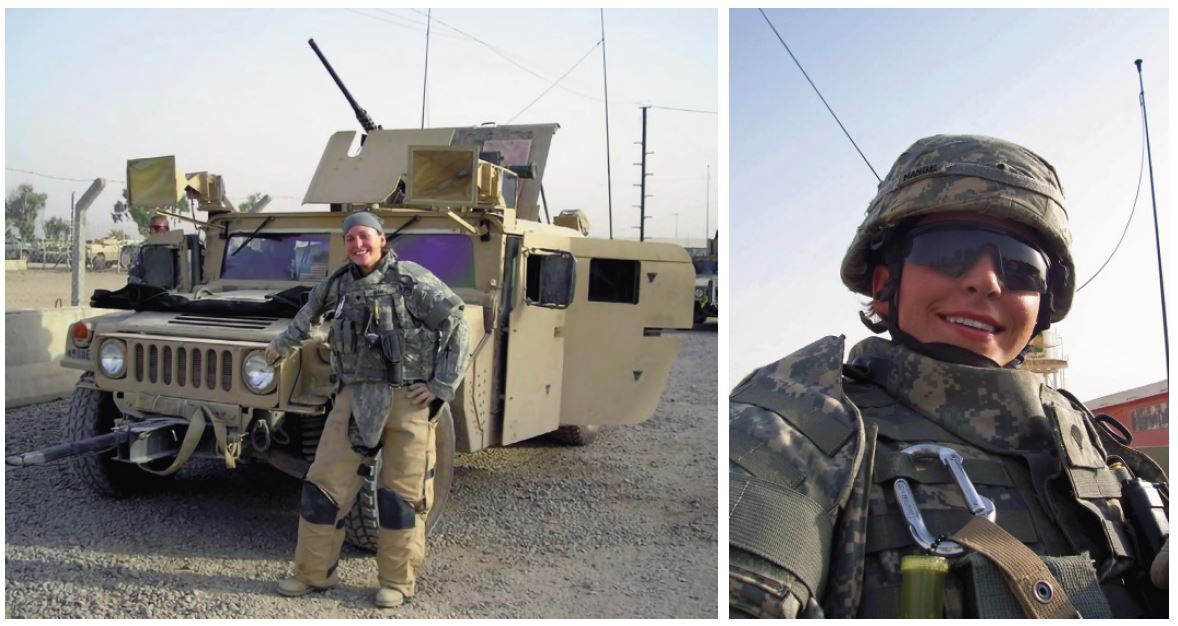
WOUNDS OF WAR: Margaux Mange on patrol with 630th MP Company in Iraq; "It didn't affect me badly until March 2007, when my best friend, Ashley, and two others were hit with a fifty-pound explosive device. They were in the truck right behind me. When the IED detonated, it flipped their truck completely upside down and killed all of them instantly."
SECOND TIME AROUND
After this incident, Margaux continued going out on patrols, doing her regular job as a gunner and not thinking anything had happened to her. She was more concerned about the others on the team than herself. As a result, their combat patrols became much more dangerous. As she describes, “It didn’t affect me badly until March 2007, when my best friend, Ashley, and two others were hit with a fifty-pound explosive device. I was riding on Truck #5, and they were in the truck right behind me, in Truck #6. When the IED detonated, it flipped their truck completely upside down and killed all of them instantly. Their bodies burned as I watched. The fire must have burned for more than an hour. I still cannot forget that sight!”
"My PTSD was off the charts. I realized I would not be returning to Iraq and felt like I had abandoned my team. I felt like I was a traitor."
THE LONG BATTLE BEGINS
This was the beginning of Margaux's long battle with TBI and PTSD. Her face developed Bell's palsy, a paralysis or weakness of the muscles on one side of the face, which she now thinks came from the mental stress she had suffered. She recalls, "The doctors thought maybe this was happening because I was in the third trimester of a pregnancy or because I had slept on my face wrong … or due to some other cause. They were idiots and wouldn't accept that it was due to stress."
Eventually, she was sent back to Landstuhl. In April 2007, she began receiving further medical attention, and the doctors finally
realized that her initial concussion and mental state were more severe than initially diagnosed. Recalling those dreary days, Margaux describes her feelings, “I had atypical nerve pain and trigeminal neuralgia. At that time, my post-traumatic stress was off the charts. I realized I would not be returning to Iraq and felt like I had abandoned my team. I felt like I was a traitor. So when I left them, I told them I would be back in a couple of weeks.” Instead, her unit was deployed for thirteen months, and she would not see them until they returned to Germany. She vowed to them through email that she would not drink or celebrate anything without them. “I did not touch alcohol until they returned. I was in so much pain anyway that I couldn’t drink if I wanted to, so I slept fourteen hours every day in Bamberg.”
Margaux spent her days visiting the hospital three hours away from Bamberg, and there she received a multitude of pills – morphine, Percocet, and more medications. Then the doctors decided her PTSD was so bad that they sent her home to Colorado because that was where her family lived.
Remembering that journey home to Colorado and checking in, Margaux says the Army doctors gave her a choice, "Stay on pills for the rest of my life or try brain surgery." She finally had brain surgery in March 2008. That was the beginning of the end of her active Army duty.
"The surgery was performed to try and alleviate the pain. However, I was in so much pain I couldn't even walk up a flight